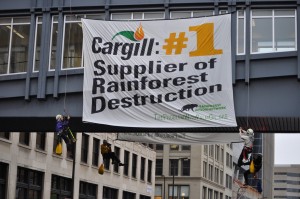
Today, Cargill updated its palm oil commitments. While it’s significant that Cargill has committed to a global baseline of RSPO certification, the RSPO in its current form does not guarantee that certified palm oil entering U.S. consumer brands is free of ties to deforestation, climate change, species extinction, human or Indigenous rights violations, and/or slave labor.
Here is the official statement that RAN just released:
Rainforest Action Network Statement on Cargill’s Commitment to Supply RSPO Certified Palm Oil by 2015
SAN FRANCISCO (July 12, 2011) – Today, Cargill announced new commitments covering palm oil products that it supplies to its customers in Europe, the United States, Canada, Australia and New Zealand, indicating that they should be certified by the Roundtable on Sustainable Palm Oil (RSPO) and/or originate from smallholder growers by 2015. This goal excludes palm kernel oil products. The company will also extend its commitment to cover 100% of its palm oil products and all customers worldwide by 2020.
Lindsey Allen, Forest Program Director for the Rainforest Action Network, which has been pressuring Cargill to adopt safeguards for its global palm oil supply chain since 2007, issued the following statement in response to Cargill’s announcement.
“Cargill’s move to phase out controversial palm oil from its supply chain is a good first step toward protecting our most endangered rainforests and the climate, but it comes at a time when we need leaps. Palm oil is a leading cause of Indonesia’s deforestation, greenhouse gas emissions and loss of critical orangutan habitat, and the next five years are crucial. The sad reality is that we can’t wait until 2015, let alone 2020, for greater corporate leadership.
“Currently in addressing the severe problems with palm oil, Cargill is putting all its eggs in one basket, the RSPO, and that basket is riddled with holes. As an example, RSPO certification in its current form does nothing to address climate change from palm oil production, which science tells us is contributing to record greenhouse gas emissions.
“Cargill’s commitment comes in response to rising demand from its customers and the public for palm oil that is free from controversy. RAN is discouraged that Cargill has chosen to exclude a significant portion of palm oil products consumed in North American and European markets derived from palm kernel oil (PKO) in its commitment. By excluding PKO, Cargill will fail to supply certified palm oil for many of the products we buy in supermarkets every day and fail to meet the rising demand of it customers.
“As an influential member of the RSPO and a company than touches one quarter of the world’s palm oil, Cargill has the potential to transform the global palm oil marketplace. RAN is demanding that Cargill move the dates of its commitment up, fully segregate its supply chain, and adopt basic safeguards around greenhouse gas emissions, human rights and biodiversity loss, which is not currently ensured by the RSPO.”
For more information on RAN’s Cargill and palm oil campaign, please visit: www.ran.org/cargill